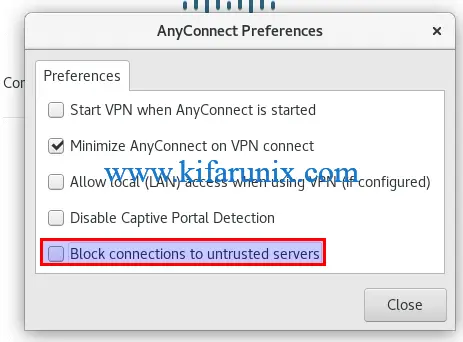Cisco AnyConnect Secure Mobility Client – Linux Installation
The newest Cisco AnyConnect Secure Mobility Client is now available for use on many Linux distros in use by the BU community. Depending on which Linux distro you use, there may be some dependencies and configurations required. Installation instructions are provided below for the more common distros in use at BU.
CentOS 6
September 29, 2019 Ocserv (openconnect server) is a great ssl vpn server that simulate cisco anyconnect vpn server on ASAs. Today we are going to show you how to install ocserv ssl vpn server on CentOS 7 linux. How to install ocserv ssl vpn server on CentOS 7 linux. This should theoretically work for RedHat7 desktop and OracleLinux7 Desktop, but it is only tested on CentOS7 GNOME desktop. The setup of Cisco AnyConnect VPN is detailed below. Install EPEL RPM.
CentOS 6
No dependencies required
- Open a web browser and navigate to vpn.bu.edu
- Authenticate with your BU login
- When prompted, click the link to download the install script
- Allow execution on the downloaded script:
chmod +x /path/to/anyconnect-linux64-4.4.03034-core-vpn-webdeploy-k9.sh
- Execute the script as root
sudo /path/to/anyconnect-linux64-4.4.03034-core-vpn-webdeploy-k9.sh
- After installation is complete, Cisco AnyConnect will appear in your applications menu. If you are using the command line, you can connect with the following command:
/opt/cisco/anyconnect/bin/vpn connect vpn.bu.edu[/pool]
CentOS 7
CentOS 7
- Install dependencies:
sudo yum install epel-release
sudo yum install pangox-compat
- Open a web browser and navigate to vpn.bu.edu
- Authenticate with your BU login
- When prompted, click the link to download the install script
- Allow execution on the downloaded script:
chmod +x /path/to/anyconnect-linux64-4.4.03034-core-vpn-webdeploy-k9.sh
- Execute the script as root
sudo /path/to/anyconnect-linux64-4.4.03034-core-vpn-webdeploy-k9.sh
- After installation is complete, Cisco AnyConnect will appear in your applications menu. If you are using the command line, you can connect with the following command:
/opt/cisco/anyconnect/bin/vpn connect vpn.bu.edu[/pool]

Ubuntu 18.04
Ubuntu 18.04

Ubuntu 18.04 is currently unsupported with the Cisco AnyConnect Secure Mobility Client.
Ubuntu 16.04
Ubuntu 16.04
No dependencies required
- Open a web browser and navigate to vpn.bu.edu
- Authenticate with your BU login
- When prompted, click the link to download the install script
- Allow execution on the downloaded script:
chmod +x /path/to/anyconnect-linux64-4.4.03034-core-vpn-webdeploy-k9.sh
- Execute the script as root
sudo /path/to/anyconnect-linux64-4.4.03034-core-vpn-webdeploy-k9.sh
- After installation is complete, Cisco AnyConnect will appear in your applications menu. If you are using the command line, you can connect with the following command:
/opt/cisco/anyconnect/bin/vpn connect vpn.bu.edu[/pool]
Ubuntu 14.04
Ubuntu 14.04
No dependencies required
- Open a web browser and navigate to vpn.bu.edu
- Authenticate with your BU login
- When prompted, click the link to download the install script
- Allow execution on the downloaded script:
chmod +x /path/to/anyconnect-linux64-4.4.03034-core-vpn-webdeploy-k9.sh
- Execute the script as root
Cisco Vpn Centos 7
sudo /path/to/anyconnect-linux64-4.4.03034-core-vpn-webdeploy-k9.sh
Cisco Anyconnect Centos 7 Download
- After installation is complete, Cisco AnyConnect will appear in your applications menu. If you are using the command line, you can connect with the following command:
Centos 7 Iso

Centos 7 Download
/opt/cisco/anyconnect/bin/vpn connect vpn.bu.edu[/pool]
